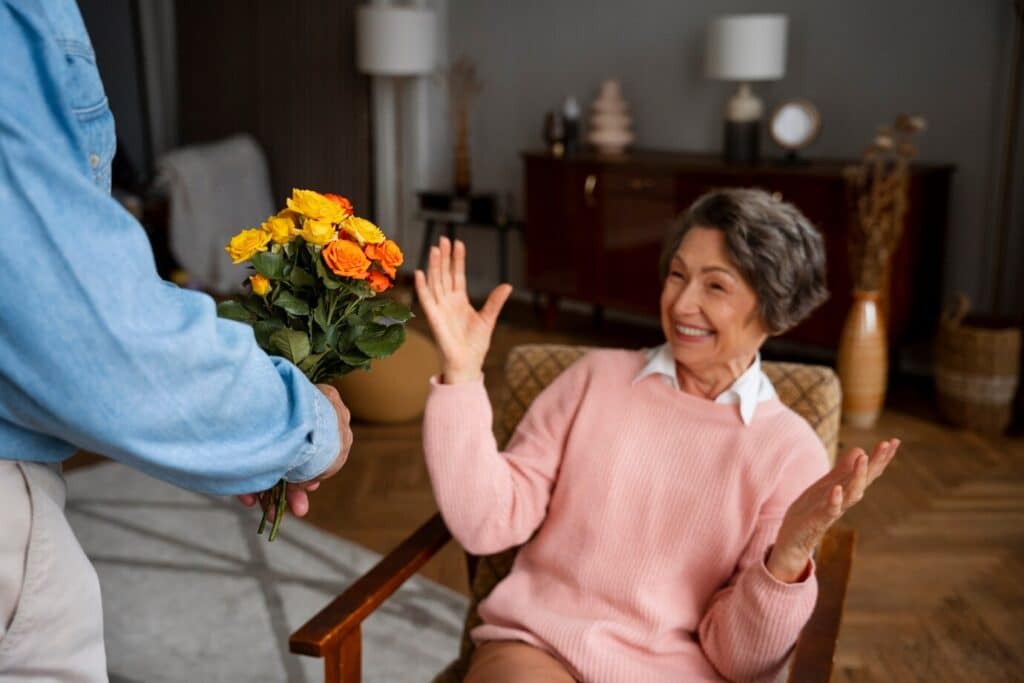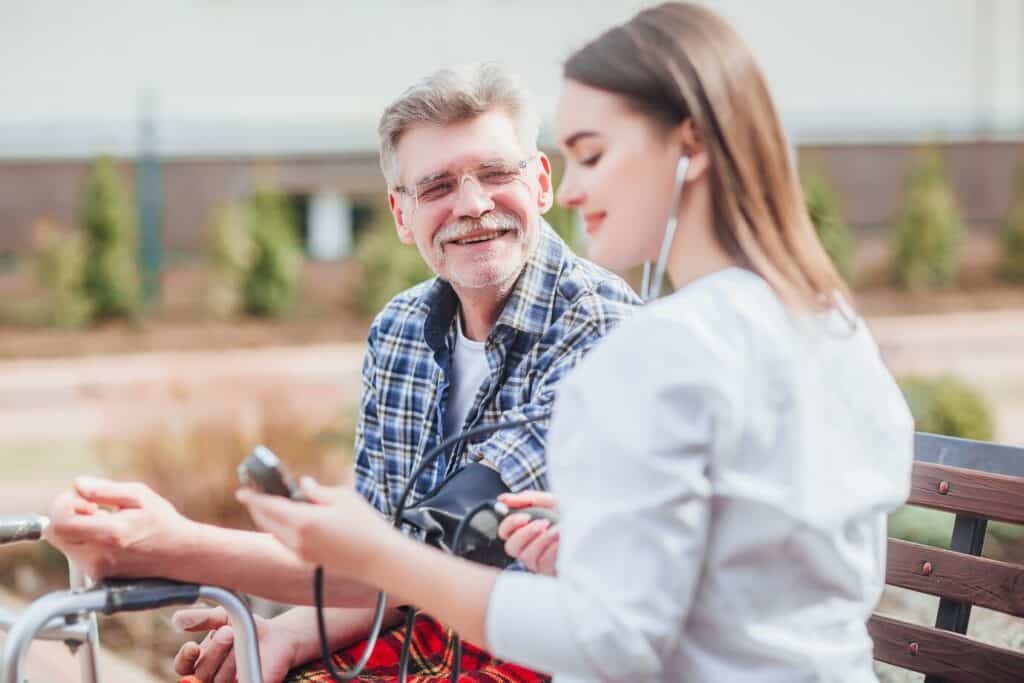Caring for elders is more than just managing their physical well-being—it means understanding, nurturing, and supporting their emotional needs. Whether they are living at home or in a senior care community like Westmont of Culver City, seniors thrive when surrounded by meaningful connections, compassion, and attentive care.
In this article, we’ll explore how emotional support enhances the lives of seniors, ways to reduce loneliness and depression, and the importance of elderly care through different living settings, including insights on how to take care of the elderly at home and how to care for the elderly in a nursing home.
Understanding Emotional Needs in Elder Care
When caring for elders, it’s essential to go beyond physical support and focus on emotional wellness. Elders often face emotional transitions—loss of independence, friends, or even spouses. Addressing their emotional needs means creating an environment that promotes open communication and empathy.
Active listening is a key component. Take time to understand their stories, emotions, and daily experiences. It fosters trust and builds a safe space where they feel valued. Incorporate community activities like group games, art classes, or music therapy to encourage engagement and emotional balance. These activities also serve as helpful tools for those exploring how to care for the elderly in a nursing home.
The Impact of Loneliness and Isolation
Caring for elders includes tackling loneliness, a common emotional burden for many seniors. Whether at home or in senior living communities, isolation can significantly impact mental health. Studies show that long-term loneliness can lead to depression, cognitive decline, and even physical illness.
You can help combat this by encouraging elders to stay socially active. Invite them to join community clubs, senior centers, or faith-based gatherings. Technology can also bridge emotional gaps—help them learn how to use video calls, social media, or virtual meetups.
By using tech-savvy options and scheduling regular outings, those asking how to take care of the elderly at home can offer meaningful alternatives to isolation. Regular health check-ups can also detect signs of loneliness and ensure their emotional state is monitored.
For more resources on staying socially engaged, AARP provides excellent insights into preventing social isolation.
Recognizing Signs of Anxiety and Depression
An essential part of caring for elders is spotting symptoms of anxiety or depression—conditions that are often overlooked or mistaken for typical aging behaviors. Seniors may not vocalize their feelings, so it’s important to watch for subtle changes.
Common signs include:
- Withdrawal from previously enjoyed activities
- Loss of appetite or changes in sleeping patterns
- Restlessness or increased irritability
- Fatigue or unexplained physical complaints
If you’re wondering what it’s called when you take care of the elderly at home, it’s often referred to as “home caregiving” or “in-home care.” Regardless of the terminology, recognizing mental health signs at home is just as important as in assisted living settings. Be patient, listen actively, and encourage regular conversations about how they’re feeling emotionally.
Also, be aware of how late-onset anxiety can develop due to life changes, such as health issues or losing a partner. To better understand these emotional challenges, visit Mental Health America.
Explore more about late-onset anxiety and how it impacts seniors at Westmont Living.
Practical Ways to Foster Emotional Well-Being
Supporting the emotional health of elders doesn’t always require big gestures. Small, meaningful moments often have the biggest impact. Here are some easy-to-implement activities that caregivers can use—both at home and in community settings:
| Mindful Interactions | Creative Activities | Benefits |
| Share daily stories | Painting or drawing | Boosts self-expression |
| Encourage reminiscing | Scrapbooking | Strengthens memory |
| Practice active listening | Gardening | Improves mood and bonding |
These practices are perfect for those learning how to take care of the elderly at home and want to promote emotional resilience. Even a simple gesture like sharing a cup of tea and chatting about fond memories can make them feel seen and supported.
Additionally, fostering human connection plays a pivotal role in emotional stability. At Westmont of Culver City, activities are designed to help elders stay engaged, fulfilled, and emotionally healthy.

Building Strong Connections With Elders
A strong emotional bond is at the heart of caring for elders. These connections are built through consistency, empathy, and interaction. Whether you’re a family caregiver or a professional, showing up with compassion can transform the lives of those you care for.
Participate in intergenerational activities like storytelling, game nights, or shared meals. Such events offer joy and stimulate cognitive health. For those exploring how to care for the elderly in a nursing home, establishing routines and personal rituals can offer emotional security.
Joining companionship programs, where volunteers spend quality time with seniors, is another excellent way to support those who may not have nearby family. These relationships foster emotional richness and reduce feelings of neglect.
Remember, the importance of elderly care goes beyond routine assistance—it’s about building lasting emotional connections. Staying active and connected helps maintain mental strength and a sense of purpose.
Why Emotional Support is Essential in Elder Care
Understanding the importance of elderly care means acknowledging that emotional health is intertwined with physical wellness. A well-cared-for elder feels secure, connected, and valued.
This holds true whether you’re:
- Offering personal in-home care
- Considering assisted living solutions
- Supporting elders during transitional phases
Regardless of location or living arrangement, caring for elders involves attentiveness, intentionality, and a loving presence.
At Westmont of Culver City, we strive to meet both physical and emotional needs by offering personalized care, social activities, and supportive environments. Our goal is to help seniors thrive, not just survive.
Schedule a Visit and Learn More
If you’d like to learn more about our community and how we can help, please call us at 310-736-4118. You can also schedule a tour to see our facilities and meet our staff by visiting this link.
Your Role Matters: Enriching the Lives of Seniors
Being involved in caring for elders is both a privilege and a responsibility. From managing physical health to fostering emotional strength, your presence can uplift, inspire, and create lasting happiness in their lives.
Whether you’re just learning how to take care of the elderly at home or supporting a loved one through a care facility, your efforts make a difference. Through daily acts of love, understanding, and attention, you help them feel valued and fulfilled.
If you’re unsure where to begin, start with conversations. Ask questions. Share stories. And most importantly, listen. Every elder deserves to be heard and respected.
Explore more about our senior living programs and services by visiting our website at Westmont of Culver City.
How Do The Costs Of Moving Into A Quality Senior Care Community Compare With The Costs Of Staying At Home?Compare The Costs of Senior Living vs Staying at Home
Frequently Asked Questions
How will you take care of elderly people?
Taking care of elderly people involves addressing their physical, emotional, and social needs. This includes helping with daily activities like bathing, grooming, medication management, and providing nutritious meals. Emotional support is just as important—offering companionship, engaging in conversations, and creating a sense of community can help reduce loneliness. It’s also essential to ensure their safety at home by removing hazards and encouraging regular health checkups.
Why is it important to care for your elders?
Caring for your elders shows respect and appreciation for the wisdom and sacrifices they’ve made throughout their lives. As people age, they may face physical limitations, memory loss, or health conditions that require extra support. Providing care ensures they maintain a good quality of life and feel valued. It also helps preserve family bonds and teaches younger generations the importance of empathy and responsibility.
What is the meaning of caring for the elderly?
Caring for the elderly means providing assistance that supports their health, comfort, and overall well-being. It involves helping with daily activities, ensuring medical needs are met, and offering emotional companionship. This care can take place at home, in assisted living, or in professional care facilities. Ultimately, it’s about honoring their dignity and ensuring they feel safe, loved, and respected.
What to do when an elderly person needs care?
When an elderly person needs care, the first step is to assess their physical, emotional, and medical needs. Consult with healthcare professionals to determine the right level of support—whether it’s in-home care, a senior living facility, or a combination. Involve the senior in decisions whenever possible to ensure their preferences are respected. Also, explore available resources, such as community programs and caregiver support services, to provide well-rounded care.








